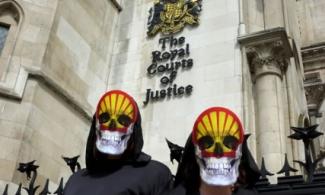
Shell will appear in the High Court in London today to be held accountable for its oil spills in the Niger Delta region of Nigeria. Over 11,000 Nigerians from Bodo town in the Ogoni region of the Delta are suing Shell over the environmental damage caused by two devastating oil spills in 2008 and 2009. Shell has admitted liability but refuses to provide adequate compensation to the many thousands of victims of the spills. The court hearing will deal with matters of civil procedure.
Shell will appear in the High Court in London today to be held accountable for its oil spills in the Niger Delta region of Nigeria. Over 11,000 Nigerians from Bodo town in the Ogoni region of the Delta are suing Shell over the environmental damage caused by two devastating oil spills in 2008 and 2009. Shell has admitted liability but refuses to provide adequate compensation to the many thousands of victims of the spills. The court hearing will deal with matters of civil procedure.
This is the first time Shell has faced legal action in the UK over its pollution in Nigeria. Ahead of the hearing, activists from London Rising Tide[i] will stage an eye-catching protest outside the court to demand that Shell cleans up its pollution in the Delta, adequately compensate those affected and end its daily abuse of basic human and environmental rights. Pictures of the action are available to download here. Shell’s oil spills in Bodo were caused by a double-rupture in a high-pressure pipeline that runs through Ogoniland. An independent assessment found that 103,000 to 311,000 barrels of oil flooded into Bodo Creek during the spill. That is 60 times larger than the 1,640 barrels Shell claims to have spilled.[ii] Many of Shell’s pipelines, which span 6,000 km across the Delta, are rusty, leaky and decades old. Corrosion and equipment failure have led to almost daily oil spills.[iii] Despite this, Shell continues to blame local residents for the majority of the oil spills and point to sabotage. Under Nigerian law, Shell is required to clean any oil spills from its activities regardless of the cause. Yet frequently the company has failed to comply with the law. In August 2011, a report on oil pollution in Ogoniland by the UN Environment Programme found that Shell had certified highly polluted sites as “clean”, and failed to meet Nigerian requirements and company standards. In one case UNEP found heavy contamination 40 years after an oil spill occurred.[iv] Decades of pollution could take 25 to 30 years to clean up and an initial fund of $1 billion would be required to kick-start the process. Tony Cottee from London Rising Tide said: “Shell’s oil spills in Bodo are clear examples of Shell’s capacity to destroy the environment, deny remedies to those affected and delay the course of justice. With such an appalling record in Nigeria, it is deplorable that Shell plans to start drilling in the fragile Arctic Ocean this summer. An oil spill in sea ice conditions could be catastrophic.” Ben Amunwa from oil watchdog Platform[v] said: “Four years after Shell’s major spills in Bodo, the company has failed to clean up its mess and refuses to adequately compensate victims who have been pushed into poverty by Shell’s pollution. The people of Bodo have been denied access to justice in Nigeria.[vi] Now they seek justice in London as a last resort.” Contact: Ben Amunwa, (Platform), +44(0)7891 454 714, [email protected]. Find twitter updates at #bodovshell. Picture credit: Ben Amunwa / Platform Notes: [i] London Rising Tide takes creative action on the root causes of climate chaos, and promotes socially just, ecological alternatives to the fossil fuel madness that we're living through. See http://www.londonrisingtide.org.uk/. [ii] http://www.guardian.co.uk/environment/2012/apr/23/shell-nigeria-oil-spill-bigger [iii] For information on Shell’s infrastructure, see: http://www.shell.com.ng/home/content/nga/aboutshell/shell_businesses/e_and_p/spdc/. For analysis of Shell’s lack of pipeline integrity and failure to prevent leaks and ruptures, see pages 29 – 36 in Steiner, (2010), http://milieudefensie.nl/publicaties/rapporten/double-standard. For estimates of total oil spill figures, see Appendix 1 and 2 in Steiner, (2010). [iv] UNEP Ogoni Environmental Assessment, page 9, http://postconflict.unep.ch/publications/OEA/UNEP_OEA.pdf. [v] Platform campaigns in support of individuals and communities whose human rights are affected by the global oil industry. See http://platformlondon.org/. [vi] The International Commission of Jurists in a 2012 report says that the victims of corporate human rights abuses in Nigeria “face major obstacles when seeking justice.” See http://www.icj.org/default.asp?nodeID=349&sessID=&langage=1&myPage=Legal_Documentation&id=23944.googletag.cmd.push(function() { googletag.display('content1'); });
googletag.cmd.push(function() { googletag.display('comments'); });
googletag.cmd.push(function() { googletag.display('content2'); });